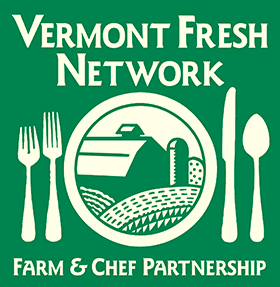Preservation for a Vermont Winter with Misery Loves Co.
 December 7, 2016
December 7, 2016
There’s a tradition at Misery Loves Co. where every year, after a few freezes, the staff heads out to the back parking lot to harvest the wild grapes that ramble down the alley. They aren’t sure what kind of grapes they are, but they are sour, tart and bitter and the seeds are the size of the grapes themselves. The grapes are a challenge to process but come late winter, when the duck and pheasant have been hanging just long enough, those preserved alley grapes will be the perfect accompaniment.
Nasturtium bud capers, dehydrated potato skin stock, lacto-fermented ramp tops and spruce tip vinegar are all results of the ‘kitchen magic’ at Misery Loves Co. in Winooski. It’s easy to celebrate tomatoes or berries in season but it takes vision, labor, skill, and patience to take the ingredients into the long winter. Chef/co-owner Aaron Josinsky has a gift for realizing potential in under-used ingredients like potato peels or nasturtium buds. “After harvesting the flowers, we were left with all these buds and they were peppery but too strong,” he described, “I salted them to release the water, added a lacto fermented juice [another key ingredient in the Misery kitchen] and let them go for 10 days or so.” The capering process tones-down the strong flavor of the buds, and the resulting capers are bright and briny – perfect for the tartare. Leftover potato peels are dehydrated and used to make a stock that's both vegetable based and creamy enough to add richness without relying on the kitchen crutch of butter or cream.
Fermentation, dehydration and preservation using vinegar, salt, sugar, or fat are a smart way to cut down on waste in the kitchen, but the labor it takes to process the large amounts of produce into tiny yields of vinegars, dehydrated bits and preserves far out-costs the money saved. It’s a larger vision that makes these processes worth the effort. Josinsky is focused on preserving the tradition of preservation as much as he’s interested in making unique ingredients for the restaurant. “This all used to happen on the farm,” Josinsky pointed out, “but it’s not anymore and no one knows how to do it.” With the little free time a restaurant owning family has together, Josinsky and co-owner/wife Laura Wade have turned their North Hero home into a homestead with experimental gardens, chickens and fermentations projects taking over their kitchen. “Our house looks like a witch’s cottage,” Wade joked. Even their young daughter, Eda, gets in on the action. Her favorite activity? “Making lilac honey with her dad,” Wade shared. Every summer the two of them infuse honey with the different varietals of lilac that grow around their home. The whole process from soil to plate and capturing native flavors is a real focus for Aaron and Laura right now. Planning for next season has already begun – more land has been turned for gardens, seed catalogues are out, and there’s even talk of bees.
Treat yourself to dinner in Winooski this week and you can try elderflower honey on the fresh cheese plate, kimchi in the brussels sprouts, Concord grape vinegar in the My Uncle Oswald cocktail, and never pass up a pickle plate.

